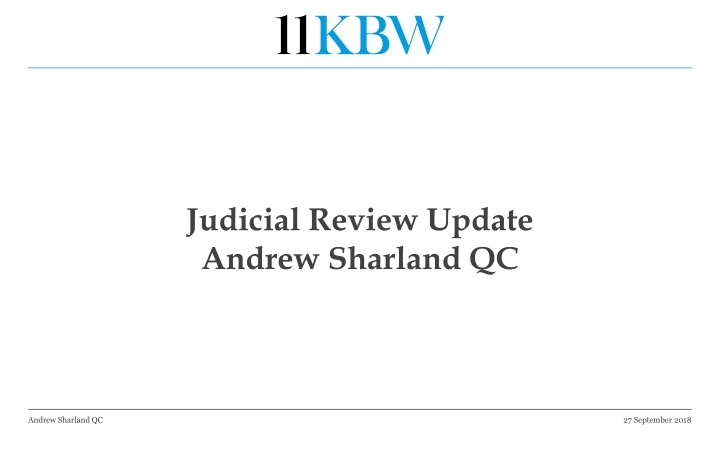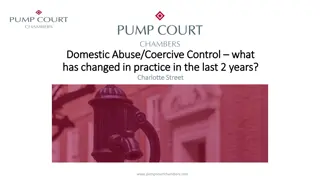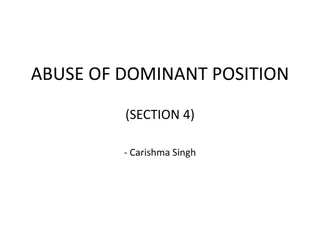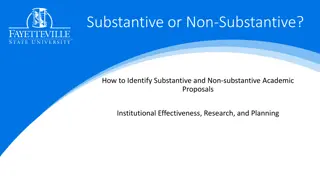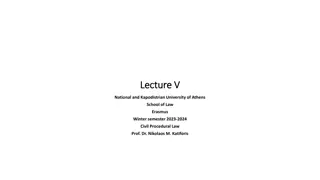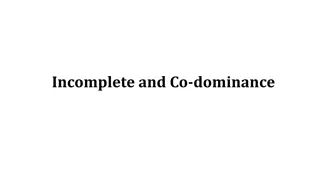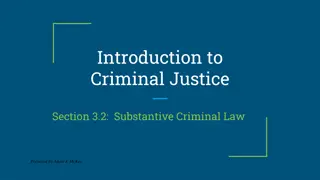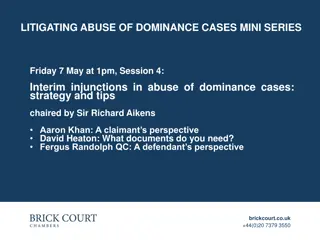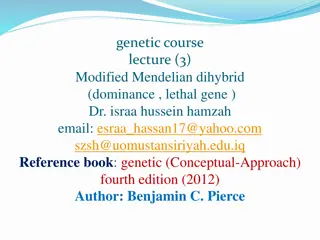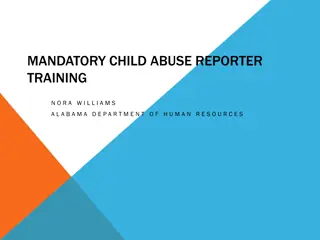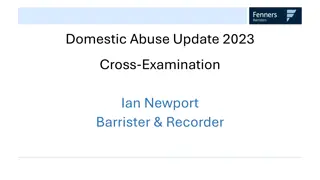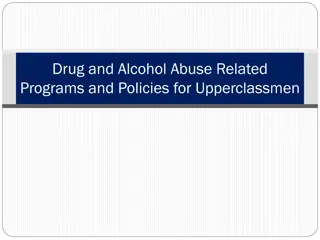Substantive Developments in Litigating Abuse of Dominance Cases
Substantive developments of practical interest for litigating abuse of dominance cases discussed in a mini-series with sessions focusing on various aspects of abuse, chaired by legal experts. The shift from a pigeon-hole approach to a more fluid one is analyzed, highlighting implications for litigation and trial strategies.
Download Presentation

Please find below an Image/Link to download the presentation.
The content on the website is provided AS IS for your information and personal use only. It may not be sold, licensed, or shared on other websites without obtaining consent from the author.If you encounter any issues during the download, it is possible that the publisher has removed the file from their server.
You are allowed to download the files provided on this website for personal or commercial use, subject to the condition that they are used lawfully. All files are the property of their respective owners.
The content on the website is provided AS IS for your information and personal use only. It may not be sold, licensed, or shared on other websites without obtaining consent from the author.
E N D
Presentation Transcript
Judicial Review Update Andrew Sharland QC Andrew Sharland QC 27 September 2018
Introduction 1. The duty to give reasons 2. Systemic challenges 3. The public sector equality duty 4. Bias 5. Irrationality 6. Procedural matters
Duty to give reasons (1): The Court of Appeal Oakley v South Cambridgeshire DC [2017] EWCA Civ 71 PP granted for football stadium in green belt with no reasons in face of officer s recommendation to refuse Breach of common law duty to give reasons Sales LJ: where as here there is a departure from the development plan, need for reasons especially pressing Elias LJ: More radical. Common law moving towards general duty to give reasons unless there is a proper justification for not doing so.
Duty to give reasons (2) Dover DC v CPRE Kent [2017] UKSC 79 Council approved application for 521 houses against the advice of its own planning officers. No reasons given. If EU law governs (requiring an EIA) there is a duty to give reasons regardless of outcome. However, aggrieved party will only succeed in a challenge if they can show that there are substantially prejudiced by the failure No general common law duty to give reasons when granting permission. If significant and long lasting effect on local community and where the Committee disagreed with planning officer, the common law duty to give reasons should apply. Oakley correctly decided.
Systemic challenges R (Woolcock) v Secretary of State for Communities and Local Government [2018] EWHC 17 (Admin) Challenge to system for enforcing council tax whereby defaulters are committed to prison for non-payment Alleged that procedure was systemically unfair Divisional Court dismissed the challenge
Systemic challenges Woolcock cont. Whether procedure is fair is a matter for the court. An administrative scheme will be open to a systemic challenge if there is something inherent in the scheme that gives rise to an unacceptable risk of procedural fairness Conceptual difference between something inherent in a system that gives rise to an unacceptable risk of procedural fairness and even a large number of decisions that are simply individually aberrant The Claimant must identify the decision under challenge
R (JHRW) v Leicester City Council [2018] EWCA Civ 1551 Applicability of psed to Council resolutions Extent of regard necessary Evidence used to demonstrate due regard has been had- close scrutiny of the debates
Bias R (Miller) v Heath Service Commissioner for England [2018] EWCA Civ 144 Apparent pre-determination bias Lewis J at first instance concluded no pre-determination CA allowed appeal From outset Ombudsman treated doctors as guilt as charged Pre-determination arises when a judge or other decision maker reaches a final conclusion before he or she is in possession of all the relevant evidence and arguments.
R (Gallaher Group Ltd) v CMA [2018] UKSC 25 Equal treatment not a distinct ground of judicial review Substantive unfairness not a distinct ground of judicial review conspicuous unfairness adds nothing Focus on ordinary principles of judicial review: irrationality and legitimate expectation
R (Citizens UK) v SSHD [2018] EWCA Civ 1812 Duty of candour Different to disclosure A self-policing duty: the good the bad and the ugly Witness statements filed on behalf of public authorities must not deliberately or unintentionally obscure areas of central relevance. There can be no place in this context for spin The duty of candour is a duty to disclose all material facts known to a party in judicial review proceedings. The duty not to mislead the court can occur by omission, for example by the non-disclosure of a material document or fact or by failing to identify the significance of a document or fact
R (Khan) v SSHD [2018] EWCA Civ 1684 M v Croydon and KN (Afghanistan) lay down three categories of case: (a) cases where a claimant had been wholly successful, whether following a contested hearing or pursuant to a settlement, in which a claimant should normally be entitled to all of his costs; (b) cases where a claimant had only succeeded in part, whether following a contested hearing or pursuant to a settlement, where there was much to be said for making no order for costs; (c) cases where there had been some compromise which did not actually reflect the claimant's claims, where there was an even stronger case for there to be no order for costs courts should not let disputes about costs turn into satellite litigation about the merits of the underlying claim
